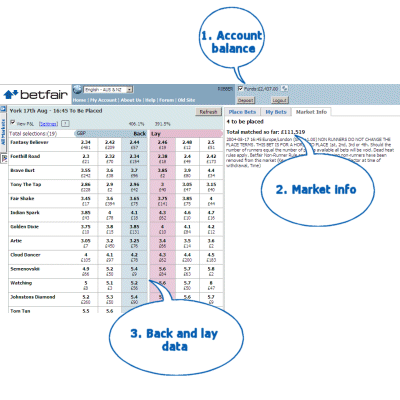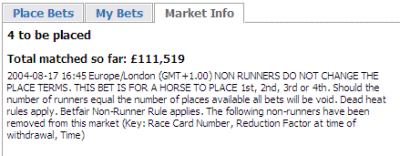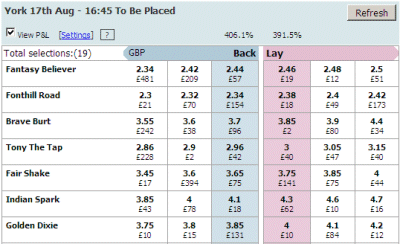| |
How To Use A Betting Exchange
Betting Exchange Guide Contents
Exchange Intro
|
Why They Exist
|
The Best Exchanges
|
The Benefits
|
The Disadvantages
|
What the Numbers Mean
Betting Exchanges have lots of Numbers
The first time you visit a betting exchange you may be a little put off by all the different numbers that you see. That's why we have
produced this page. We have used a screen shot from Betfair, one of the leading exchanges, to walk you through exactly what each of
the numbers mean. You'll soon get the hang of it.
The Big Picture

The image above displays a screenshot of a typical betting exchange, the numbered labels refer to the more specific images below.
1. Account Balance

This one is pretty straight forward really. Your account balance shows you how many funds you have available in your account.
It does need a little more info though. As soon as you place a bet the maximum liability will be deducted from your account. This
is to ensure that you never have total exposures greater than your account balance.
Sometimes though, the balance displayed does not reflect your actual balance. If you have just placed a bet it is a good to
"refresh" the view of your account balance. Using the image above as an example, this can be achieved by clicking on the little
icon to the right of the account balance figure.
This should make sure that during a busy day of live betting you don't go to place a bet only to find you have insufficient funds.
Remember that with live betting you might have a chance to get your debit card out to top up your funds because things can chnage
so quickly.
Another point worth noting, lets say you lay a horse at odds of 7.0 for �50. Your liability is �300, so don't be alrmed when you
refresh your balance before the end of the event only to see that it has dropped by some way!
2. Market Info

In the image above, where it says "Total matched so far: �111,519", this is the total amount of money that has been successfully
placed on this particular event.
It is important, especially with live betting, that this figure is quite high (really anything under �10,000 is pretty low).
The higher this figure is the more people you have betting on this event. A low figure indicates that only a few people want to
bet on this market, consequently there is likely to be a lack of liquidity. This may result in you not being able to place your
desired bet at the odds you would like, since there is nobody to take the other side of the bet.
3. Back and Lay Data

This is arguably the most important set of numbers that you need to understand, since these show the odds at which you can bet and
also the amount you bet at those odds.
Firstly, it is essential to understand the difference between backing and laying. When you back an outcome you want your selection
to win. When you lay an outcome you want it to lose. When you back an outcome you maximum loss is the amount of your stake. When
you lay an outcome your maximum loss is the odds multiplied by the stake, in other words, the amount the guy betting with you
will win.
Take a look at the picture above again and you will notice there are two coloured columns, blue and pink, and there are also
another four plain columns, 2 to the left of the blue column and 2 to the right of the pink column. As the image shows:
The blue column lists the odds at which you can back a selection.
The pink column lists the odds at which you can lay a selection.
Back and Lay Odds
The odds displayed in the blue and pink columns represent the best odds available at that particular moment in time that you can
back or lay at respectively. Think about that, if you would like to back a selection it is preferable to back at the highest odds
possible, since then you get the most return for every pound you stake though. In contrast, if are laying a selection you want to
lay at the lowest possible odds, this is because the higher the odds are, the more you have to payout if the selection does
actually win.
The result of this is that the odds for each outcome should be pretty close for the back and lay if the market is very liquid, ie
there is a ot of trading, but if the market is not very liquid the odds could be very far apart. The reason for this is
competition, if lots of people want to back a selection, and also there are many people trying to lay the same selection everyone
is competing with each other to get there bet matched.
Think about it like this, you and a stranger are both trying to get home late at night after a night on the town. It normally
costs both of you �15 to get home by cab. You have both been waiting ages for a cab, you find out off a policeman that there
is only cab running that night. 10 minutes later this cab turns up and sees both of you waiting. Who gets to go home? Both of
you want to pay �15, but both of you want to get home. Suddenly the stranger offers the cab driver �17, the cab driver's eyes
light up and tells the other guy to get in. But you are getting tired now and really want to get home so you offer �20, and
so the process could go on.
This is the fundamental concept behind a betting exchange. If people really want to back a horse they will be willing bet at
lower odds than they originally hoped for. If lots of people want to lay a horse they be willing to trade at slightly higher
odds. This forces the prices for backing and laying together in high volume markets.
To round things off, the numbers in the blue column (remember its titled "Back") represent the odds and amount of money that
other people have said they will lay a selection at. Since they have offered to lay the selection at those odds for that
amount, you can therefore form the other side of the bet and back that selection at the odds and amount quoted in the blue box.
The numbers in the pink column (remember its title "Lay") represent the odds and amount of money that other people have said
they will back a selection at. You can therefore form the other side of the bet and lay that selection at the odds and amount shown
in the pink column.
Just one more thing.... in the screenshot above there is a horse, Indian Spark, that you can back at 4.1 and lay at 4.3. However,
at these levels the odds actually go up in increments of 0.1. Therefore these odds are not quite fully in line. If you want to
trade immediately you must accept the odds in either the blue or pink columns. But if you have a bit of time you can do things slightly
differently. Lets say you want to back Indian Spark. Would you rather back at 4.1, which is currently on offer, or 4.2, which is not
currently on offer. Backing at 4.2 gives a higher payout than 4.1 so it is better to back at 4.2 if possible. You can ask to back at
4.2, your bet just won't be matched instantly. Instead what will happen is your bet will appear in the pink column - you have asked
to back at 4.2 and now you are waiting for some on to lay it at 4.2 to complete the bet.
Why does your bet appear in the pink column? Well because from a layers point of view it is better for them lay at the 4.2 that
you have just offered than the 4.3 that was previously on offer! You have actually just jumped the queue, previously the backers
were waiting to trade at 4.3 as they didn't want to accept the 4.1, however, you have compromised, you didn't want to accpet the
4.1, but equally you didn't want to risk waiting for 4.3 and end up missing out, so you jumped in the middle.
Click for list of bookmakers
|
|

